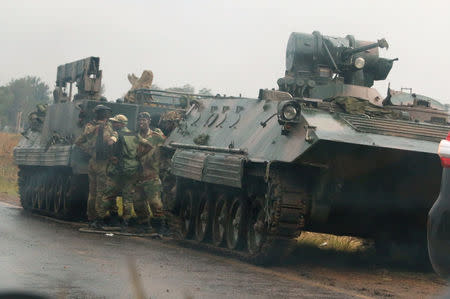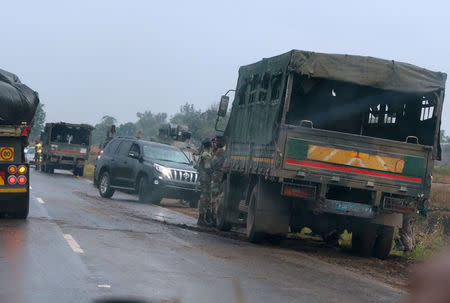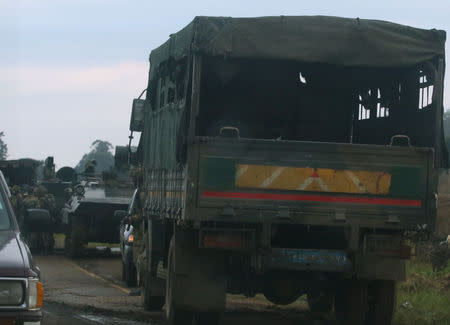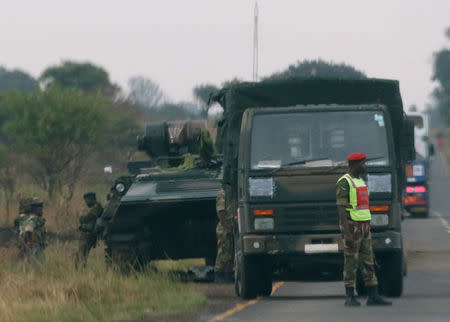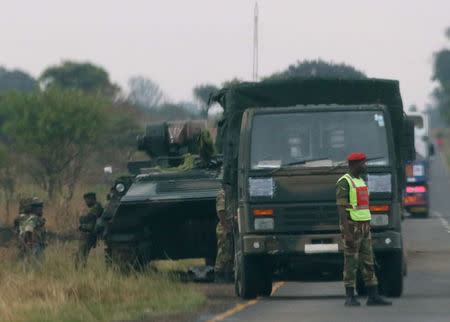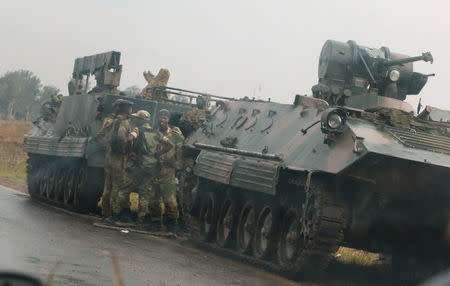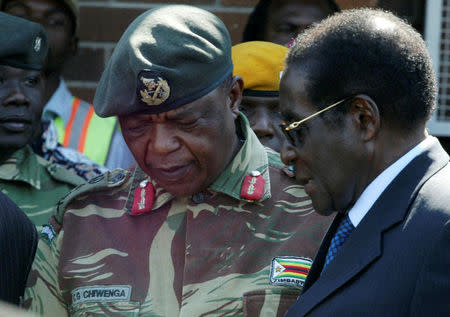Soldiers on Harare streets as ruling party accuses Zimbabwe army chief of treason
By MacDonald Dzirutwe
HARARE (Reuters) - Zimbabwe's ruling party accused the head of the armed forces of treason on Tuesday as troops took up positions around the capital in an escalation of a dispute with 93-year-old President Robert Mugabe over political succession.
Just 24 hours after military chief General Constantino Chiwenga threatened to intervene to end a purge in the ruling party, a Reuters reporter saw six armoured personnel carriers on major thoroughfares on the outskirts of the capital.
Aggressive soldiers directing traffic told passing cars to keep moving through the darkness.
"Don't try anything funny. Just go," one soldier said on Harare Drive.
The presence of troops, including the movement of at least six armoured personnel carriers from a barracks northwest of Harare, sparked rumours of coup against Mugabe, although there was no evidence to suggest Zimbabwe's leader of the last 37 years had been toppled.
The lead item on the ZBC state broadcaster's evening news bulletin was an anti-military rally by the youth wing of Mugabe's ZANU-PF party.
The Southern African nation has been on edge since Monday when Chiwenga, Commander of Zimbabwe Defence Forces, said he was prepared to "step in" to end a purge of supporters of a sacked vice president.
The unprecedented statement represents an escalation of a rumbling political struggle over who will succeed Mugabe, who has been in power since the country gained independence from Britain in 1980.
Mugabe chaired a weekly cabinet meeting in the capital on Tuesday. Afterwards, ZANU-PF said it stood by the "primacy of politics over the gun" and accused Chiwenga of "treasonable conduct... meant to incite insurrection."
Mugabe fired Vice President Emerson Mnangagwa last week. The veteran of the 1970s liberation war was popular with the military and had been seen as a likely successor to Mugabe.
The army views his removal as part of a purge of independence-era figures to pave the way for Mugabe to hand power to his wife Grace Mugabe.
A Reuters witness saw two armoured vehicles parked beside the main road from Harare to Chinhoyi, about 20 km (14 miles) from the city. One, which was pointed in the direction of the capital, had come off its tracks.
Witnesses said they saw four armoured vehicles turn before reaching Harare and head towards the Presidential Guard compound in a suburb on the outskirts of Harare.
"There were about four tanks and they turned right here, you can see markings on the road," one witness on the Chinhoyi highway said, referring to the armoured vehicles. He pointed to a road that links to the guard compound.
The troop movements raise tension on a continent where for decades armies regularly overthrew civilian governments.
"DEFENDING OUR REVOLUTION"
Neither the president nor his wife responded in public to the general's remarks and state media did not publish Chiwenga's statement. The Herald newspaper posted some of the comments on its Twitter page but deleted them.
The head of ZANU-PF's youth wing accused the army chief of subverting the constitution. Grace Mugabe has developed a strong following in the powerful youth wing.
"Defending the revolution and our leader and president is an ideal we live for and if need be it is a principle we are prepared to die for," Kudzai Chipanga, who leads the ZANU-PF Youth League, said at the party's headquarters in Harare.
Grace Mugabe's rise has brought her into conflict with the independence-era war veterans, who once enjoyed a privileged role in the ruling party under Mugabe, but who have in recent years been banished from senior government and party roles.
Decades ago, Zimbabwe had one of Africa's promising economies due in part to its agricultural exports.
The country is currently struggling to pay for imports due to a dollar crunch, which is also sparking rampant inflation only 10 years after it suffered a financial implosion caused when the central bank began to print money.
Martin Rupiya, an expert on Zimbabwe military affairs at the University of South Africa in Pretoria, said the army appeared to be putting the squeeze on Mugabe.
"There's a rupture between the executive and the armed forces," Rupiya said.
Alex Magaisa, a British-based Zimbabwean academic said it was premature to talk about a coup.
"A military coup is the nuclear option. A coup would be a very hard sell at home and in the international community. They will want to avoid that," Magaisa said.
(Additional reporting by Ed Cropley, James Macharia and Joe Brock in Johannesburg; Writing by James Macharia; Editing by Matthew Mpoke Bigg)

 Yahoo News
Yahoo News 